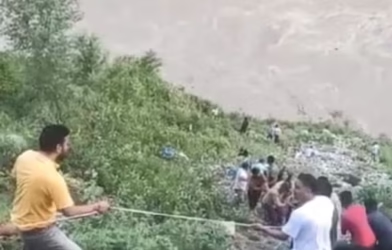288
The fathers of ancient philosophy made up largely of Greeks, were basically preoccupied with ascertaining the fundamental ingredient that constitute life. One of the most respected Ancient philosophers by name Thales came up with the hypothesis that water is the source of life because nothing ever lives without being sustained by water. If we go by the philosophy of Thales, we can easily conclude that water is life.
The theme of my reflection is on water and sanitation with specific reference to Imo state especially as the government of Imo State recently picked a Son of a retired justice of the Supreme Court of Nigeria as the Water Resources commissioner.
Imo lies in the South East of Nigeria with Owerri as its capital and largest city. Located in the southeastern region of Nigeria, it occupies the area between the lower River Niger and the upper and middle Imo River. Imo State came into existence in 1976, along with other new states created under the leadership of the late military ruler of Nigeria, Murtala Muhammad, who had previously been part of East-Central State. The state is named after the Imo River. Part of it was split off in 1991 as Abia State, and another part became Ebonyi State
Providing clean water and adequate sanitation is not just a basic human necessity; it is a fundamental driver of public health, economic growth, and social development. In Imo State, the struggle to ensure access to safe drinking water and proper sanitation facilities is particularly pronounced, with rural communities bearing the brunt of this deficiency.
As the newly appointed Commissioner for Water Resources, Ozo Obinna Ogwuegbu, embarks on a mission to address these challenges, it is crucial for the government and all stakeholders to prioritize this critical issue. This piece intends to explore why clean water and good sanitation must remain at the top of Imo State’s agenda, emphasizing the dire situation in many parts of the state and calling for concerted efforts to bring about lasting improvements.
The Current State of Water and Sanitation in Imo State
Despite being blessed with abundant natural resources, Imo State faces significant challenges in providing clean water to its residents. Reports indicate that a large proportion of the population, especially in rural areas, lack access to safe drinking water. Many communities depend on contaminated sources such as rivers, streams, and shallow wells, which are prone to pollution from agricultural runoff, industrial waste, and human activities. This situation poses severe health risks and undermines the quality of life for the residents.
Commissioner Ozo Obinna Ogwuegbu’s recent visits to various water schemes, including the Otamiri Waterworks, Umuoba, Imo State University, Dikenafai, and Ubomiri, have shed light on the pressing need for rehabilitation and completion of water projects. Despite some progress, the pace of work remains slow, and many facilities are in disrepair. The Commissioner’s audit of the Imo State Water and Sewerage Corporation (ISWSC) and the Otamiri Treatment Plant revealed that while the equipment remains intact, there is an urgent need for operational enhancements and maintenance to ensure reliable service delivery.
Health Implications of Poor Water and Sanitation
The health implications of inadequate water and sanitation cannot be overstated. Waterborne diseases such as cholera, dysentery, and typhoid fever are rampant in areas with poor water quality. These illnesses lead to severe dehydration, malnutrition, and even death, particularly among vulnerable groups like children and the elderly. The World Health Organization (WHO) estimates that contaminated water and poor sanitation are responsible for a significant percentage of diarrheal diseases, which claim the lives of hundreds of thousands of children globally each year.
In Imo State, the reliance on unsafe water sources has led to frequent outbreaks of these diseases, straining the healthcare system and causing untold suffering to affected families. The absence of proper sanitation facilities exacerbates the situation, as open defecation and inadequate waste disposal further contaminate water sources and spread pathogens. Addressing these issues is not only a matter of public health but also a moral imperative to protect the most vulnerable members of society.
Economic and Social Benefits of Improved Water Supply
Investing in clean water and sanitation infrastructure offers substantial economic and social benefits. Access to safe water reduces the incidence of waterborne diseases, thereby decreasing healthcare costs and increasing productivity. Healthy individuals can work, attend school, and contribute to the economy, creating a positive feedback loop that fosters overall development.
Improved water infrastructure can also enhance educational outcomes. In many rural areas of Imo State, children, particularly girls, spend considerable time fetching water from distant sources. This time-consuming task often results in poor school attendance and academic performance. By ensuring that clean water is available close to homes and schools, the state can improve educational participation and outcomes, empowering the next generation to break the cycle of poverty.
Environmental Sustainability and Water Management
Sustainable water management is crucial for preserving Imo State’s natural resources and ensuring long-term water security. The Otamiri Waterworks and other water schemes must be maintained and managed efficiently to prevent environmental degradation and ensure that water resources are used responsibly. This includes addressing issues such as deforestation, soil erosion, and pollution, which can affect water quality and availability.
Commissioner Ogwuegbu’s emphasis on following World Bank guidelines and engineering specifications for water projects is a step in the right direction. These guidelines promote sustainable practices that protect water sources and ecosystems. Additionally, public awareness campaigns on water conservation and hygiene practices can encourage communities to adopt behaviors that support sustainable water use and sanitation.
The Role of Government and International Partners
The Imo State government’s commitment to improving water and sanitation is evident in its engagement with international partners such as the World Bank and USAID. These partnerships can provide the necessary technical expertise, funding, and oversight to ensure the success of water projects. The Sustainable Urban and Rural Water Supply, Sanitation, and Hygiene (SURWASH) program, for instance, aims to enhance water supply and sanitation services across the state, particularly in underserved areas.
However, successful implementation requires strong political will, transparent governance, and community involvement. The state government must prioritize water and sanitation projects in its budget allocations and policy frameworks. Regular monitoring and evaluation of projects are essential to track progress and address any challenges promptly. Furthermore, involving local communities in the planning and management of water resources can foster a sense of ownership and responsibility, ensuring the sustainability of these initiatives.
Recommendations for Enhancing Water and Sanitation in Imo State
To effectively address the water and sanitation challenges in Imo State, the following recommendations should be considered:
1. Accelerate Project Completion: The state government should expedite the completion of ongoing water projects to provide immediate relief to communities lacking clean water. Setting clear timelines and holding contractors accountable can ensure timely delivery.
2. Upgrade and Maintain Infrastructure: Regular maintenance of water facilities is crucial to prevent breakdowns and ensure continuous service. Investing in modern technology and skilled personnel can improve the efficiency and reliability of water infrastructure.
3. Expand Access in Rural Areas: Special attention should be given to rural communities, where the need for clean water is most acute. Developing small-scale, community-managed water systems can provide sustainable solutions tailored to local needs.
4. Strengthen Public Health Campaigns: Public education on hygiene practices, water conservation, and the importance of sanitation can reduce the prevalence of waterborne diseases and promote healthier communities.
5. Leverage International Partnerships: Continued collaboration with international organizations can provide valuable resources and expertise. Ensuring that projects adhere to global standards and best practices can enhance their effectiveness and sustainability.
6. Enhance Regulatory Frameworks: Developing and enforcing regulations on water quality, pollution control, and environmental protection can safeguard water resources and ensure their sustainable use.
7. Promote Community Participation: Involving local communities in decision-making processes can enhance the relevance and acceptance of water projects. Community-led initiatives can also foster innovation and resilience in managing water resources.
Conclusion
The provision of clean water and good sanitation is a critical priority for Imo State, given its profound impact on health, economic development, and environmental sustainability. Commissioner Ozo Obinna Ogwuegbu’s efforts to address these challenges, supported by Governor Hope Uzodimma’s administration, demonstrate a commitment to improving the well-being of Imo’s citizens. However, achieving sustainable water and sanitation services requires concerted efforts from all stakeholders, including the government, international partners, and local communities.
By prioritizing clean water and sanitation, Imo State can unlock significant health and economic benefits, enhance educational outcomes, and ensure a better quality of life for its residents. It is a moral and practical imperative that the state government gives the needed impetus to these efforts, ensuring that every citizen, regardless of their location, has access to this vital resource. The future of Imo State depends on the health and prosperity of its people, and clean water is the foundation upon which this future must be built.
The recent activities and statements by Commissioner Ogwuegbu reflect a clear understanding of the urgency and importance of these issues. His reassurance of the state government’s commitment to providing potable water and good sanitation is a positive sign. However, words must be matched with actions. The Imo State government must ensure that the necessary resources, political will, and public engagement are directed towards achieving these goals.
In conclusion, the provision of clean water and good sanitation should remain a top priority for the government of Imo State. The health, economic prosperity, and overall well-being of its citizens depend on it. The efforts of the Commissioner for Water Resources, supported by international partnerships and community involvement, can make a significant difference in addressing the current challenges and ensuring a sustainable and prosperous future for Imo State.
Emmanuel Onwubiko is head of the HUMAN RIGHTS WRITERS ASSOCIATION OF NIGERIA and was NATIONAL COMMISSIONER OF THE NATIONAL HUMAN RIGHTS COMMISSION OF NIGERIA.












Comments are closed